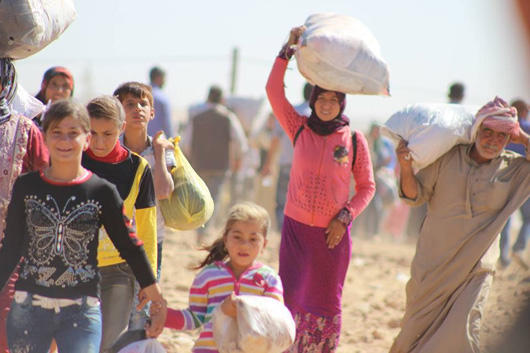Wat zijn onze verplichtingen ten aanzien van vluchtelingen? Moeten we die alleen benaderen vanuit juridisch en economisch oogpunt of is moraliteit nog niet helemaal irrelevant geworden? Mogen we van de wet wel vluchtelingen weigeren of quota’s aan ze verbinden?
Hoogleraar migratierecht Thomas Spijkerboer en rechtenstudent Richard Prins geven donderdag 17 september de aftrap voor een discussiebijeenkomst voor studenten van alle faculteiten en voor medewerkers over vluchtelingen.
De bijeenkomst wordt georganiseerd door universitair docent internationaal recht Marieke de Hoon en moet de eerste van een reeks discussiebijeenkomsten worden waarbij steeds over een ander wereldprobleem wordt gediscussieerd aan de hand van recht en politiek.
Complexe problematiek
‘De gedachte is om de universiteit te gebruiken als plek om na te denken over de complexe problematiek waar de wereld mee geconfronteerd wordt’, aldus De Hoon.
De bijeenkomsten zijn in het Engels en worden elke twee maanden gehouden op de tweede verdieping van het Initium-gebouw (waar rechten zit).
De rest van dit bericht is in het Engels:
Refugee crisis
Once every 2 months, we will use the Concilium area of our faculty as a space of thinking and discussing the complex issues the world faces from a Public International Law (PIL) perspective, in an informal setting among those that walk the grounds of our university: students and teachers alike.
Everyone is welcome to join, actively or passively, from beginning to end or just passing by, and is welcome to bring a drink or snack or what may. The first PIL Talks! is on Thursday 17 Sept at 17.15h and will be about how to think about the refugee crises that spring from violent conflicts and natural disasters, currently extremely pressing due to the conflict in Syria and Iraq.
Morality
Questions that may come to mind include what the role of law is, can be, or should be, what kind of politics law generates and what kind of law is generated by politics, what role morality has or ceased to have in thinking about refugees.
What the role of Europe is. What it matters to call them migrants or refugees. The relationship between conflicts (and intervening in them) and refugees and migration. Whether we should think about these issues in terms of law, and as such in terms of rights and obligations, and whose rights and obligations then? And what this means for the obligation of other states, such as in the Gulf area.
What it means to speak the language of law, and the language of economics (the costs, social benefit structures, employment capacity of a state etc.), rather than the language of morality, and why this language of morality is often perceived as irrelevant nowadays.
Globalizing world
Whether there is a connection (or should be) between intervening in a state militarily and providing for refugees, as a form of jus post bellum for example?
Is it justified or even lawful to refuse refugees, or have quota? Is the current way of thinking sustainable in a changing and globalizing world?
Is the current system in which refugees have to reach Europe by risking their lives and using organized criminal networks (human traffickers) before they can request refugee status justifiable in a globalized world full of conflict?
Other questions
And why does the EU or the UN for that matter not have a desk in or near crisis areas as soon as they emerge? And undoubtedly many other questions.
Professor Thomas Spijkerboer and student Richard Prins will start the discussion off with short pitches, after which the floor is open to all.
